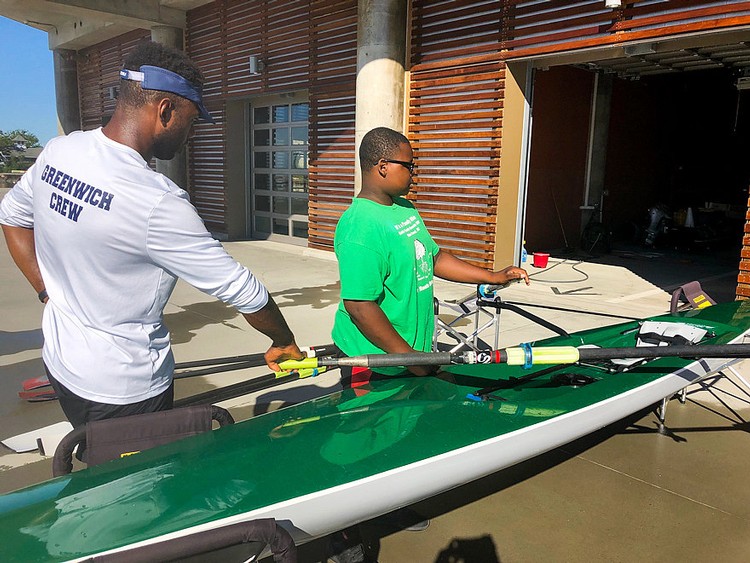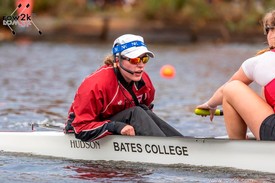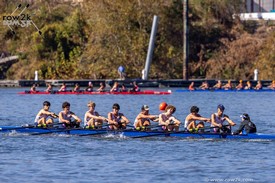Ed Hewitt, row2k.com

When Lawrence Lopez-Menzies was eight years old growing up in Shelton, CT, he attended an all-sport camp that included a session in the Yale rowing tanks.
"In the all-sport camp, they just run you through different sports," he recalls. "You play some tennis, then golf, some frisbee, basketball, football, and then one day they brought us down to the basement of Payne Whitney gym, and put us in the rowing tanks. That was the first time I ever touched an oar, and there were a lot of kids that looked like me there. We all got to do this weird thing where we moved these things through the water but didn't go anywhere - but it was cool and different."
Lopez-Menzies was encouraged by a teacher at Brunswick School, where he attended high school, to try rowing in ninth grade, and four years later he was recruited to row at Yale by John Pescatore (Steve Gladstone became the coach the next year, so Lopez-Menzies rowed for Gladstone all four years).
"Fast forward 11 years later, and I was able to walk back into those same tanks and same seats as a recruit now, in the same sport. I know that is a unique story, and I don't want it to be unique anymore."
Another 10 years later, today Lopez-Menzies is working to help launch Crew Haven, a new program based at the Canal Dock Boathouse in New Haven (where Pescatore is President). The program got off to a modest start this summer due to Covid protocols, with an eye to attracting kids from all over New Haven. The program was born from the desire of Lopez-Menzies, who was the only Black rower on the Yale heavy men's team when he was there, and others to bring the sport of rowing to underserved kids in a town that certainly has a long rowing tradition - the old Yale boathouse was situated directly across the water from Canal Dock.

"Last summer I reached out to Jim Millar about wanting to do more," said Lopez-Menzies, who had coached at Greenwich as well as in Shanghai in the past. "It was right after George Floyd's murder and the reckoning with race that everyone was experiencing, and I started looking at spaces that I was in, what role I played in them, and what they looked like, and I started really to see and get a different understanding of how homogenous rowing is at time, and started to ask myself why that is.
"When you feel something so deep in your body that you can't not do anything about it, my realization was that I can't be a Black athlete in the sport and not do anything about that. I was usually the only Black rower where I was rowing at Yale and Brunswick. I was always an 'only,' and for a long time I was okay with that, and I started not to feel okay with that. It's not that I was angry, it was just that there was suddenly a discomfort there. So in exploring that discomfort I reached out to Jim and said I really want to do something."
At first the group looked at working with Yale Community Rowing, but challenges of distance, community makeup, and logistics led them to look at the Canal Dock Boathouse right in New Haven. They contacted executive director Hollis Marten about a way to provide kids who would not normally have access to the water a place to get out in boats of all kinds, as well as support them in other areas, including academic enrichment and tutoring, family life, help obtaining social services, transportation, and more. Ultimately, they hope to offer a recreational program, a competitive program that could lead to opportunities at boarding schools and universities, and more.
Free for New Haven public school students, the program will run alongside adult and learn to row programs, event space opportunities, and other efforts at the boathouse.
"The idea is to give access to the New Haven Harbor to the community in new and beautiful ways," he said.
The Canal Dock Boathouse was built in 2017 at the mouth of New Haven Harbor across the water from Yale's original boathouse, the George Adee Memorial Boathouse, which was located on Forbes Ave (now Route 1) in 1911, and was torn down in 2009 to allow completion of the I-95 Pearl Harbor Memorial Bridge.

Crew Haven and Canal Dock will be partnering with Arshay Cooper and the A Most Beautiful Thing Inclusion Fund; read more here: Arshay Cooper and the A Most Beautiful Thing Inclusion Fund Announce Initial Programs .
The current summer program is modest in size due in part to Covid protocols as well as equipment, which limits the ranks to six students at a time, with plans for expansion on all fronts to come. Upcoming plans include PE takeovers in schools, a weekend visit from Arshay Cooper, possible programs with the Boys and Girls clubs in New Haven, outreach to stakeholders in more schools, and more.
More students of color enrolled than ultimately participated, and Lopez-Menzies emphasized that he and the program still have a lot to learn. We asked about the challenges of getting from intent and concept to actually having a lot of underserved kids in boats, an issue that has slowed or stymied many similar outreach programs.
"Whether it is me as a Black rower or someone else, no matter what we look like, we can't just come in and say 'I rowed so you should row,'" he said. "It's going to take work, and it's going to take time, and management of expectations is going to be important. If we in this work of diversifying rowing expect a group of people, who for whatever reason have not been part of a sport, to join up because we tell them to and just to trust us don't realize that trust need to be built, we will be disappointed. I am realizing that now, and I have started to do a lot of outreach to teachers and community stakeholders, because those are the people students trust.
"It would appear that rowing doesn't have the trust of people of color, of Black people," he continued. "Now it's time to start building that trust, and that is going to take time. We want it to happen immediately; I want it to happen so bad - but we are dealing with people who maybe have been kept out of something, which is a form of harm."
The most recent groups at the summer camp had included one boy who is Black and six white kids, one of whom identified as non-binary.
"So out of the first seven kids, we had one Black kid, and I was ecstatic," Lopez-Menzies said. "It was one of the first times I wasn't the only Black kid out on the water. Really I was so happy so see all of them; it was emotional for me."
Lopez-Menzies had just met another young man who is very tall but is having knee problems in contact sports, and is interested in rowing.
"He is a white kid, and I am so excited about that," he said. "Yes, we want to serve Black kids, Latinx kids, Asian kids, indigenous kids, kids of color, but at the same time this is a kid who otherwise would not be able to access rowing at all going to school here in New Haven. I am psyched to be part of a program where now we can offer that to so many people, no matter what they look like."

Lopez-Menzies has spoken to other programs, including Kris Grudt at PNRA, about the disconnect between outreach programs and then getting kids into the competitive programs, and is looking forward to exploring these issues. Laurie Yousman and Joyce Nett, current and former Yale varsity coxswains, are Crew Haven co-founders, and also spoke with groups like Oakland Strokes, RowLA and DREAM Harlem to build on lessons for athletic, academic and social emotional learning?
"It's cool now to be part of that conversation actively, working to figure that out," Lopez-Menzies said. "If we had the answer, this wouldn't be a problem. I appreciate the question, because it's a question we are all asking - how do we do this?"
"It does have to be intentional," he said, describing a couple outreach programs that were successful short term. "If you want to see a change, something has to change in the way you do things. If you want to increase diversity, it can't be an afterthought."
Lawrence Lopez-Menzies heads to Columbia University to study psychology in the fall, and will remain on the board and, when possible, the staff of the program.
Harkening back to his experience at the all-sport camp, Lopez-Menzies wants his story, as well as those of other Black athletes who have excelled in rowing, to become the norm.
"When I was getting started in rowing, there was Aquil (Abdullah), and there was David Banks. And now there is Aquil, and David Banks. The uniqueness of these stories is actually problematic. While some of these kids' stories may not end up at Yale, at least they will be able to start rowing somewhere they feel safe, which is in their own community. Then hopefully they will be able to take it further, and maybe wind up at the Olympics."
For more information on joining or supporting Crew Haven, contact Canal Dock's Executive Director, Hollis Martens here
If you enjoy and rely on row2k, we need your help to be able to keep doing all this. Though row2k sometimes looks like a big, outside-funded operation, it mainly runs on enthusiasm and grit. Help us keep it coming, thank you! Learn more.
Comments | Log in to comment |
- Bont Rowing
- Calm Waters Rowing
- Concept 2
- Craftsbury Sculling
- The Crew Classic
- CrewLAB
- Croker
- Durham Boat Co.
- Empacher
- Faster Masters
- Filippi
- Fluidesign
- h2row.net
- HUDSON
- Live2Row Studios
- Nielsen-Kellerman
- Oak Ridge RA
- Peinert Boat Works
- Pocock Racing Shells
- Race1 USA
- RowKraft
- Rubini Jewelers
- Vespoli USA
- WinTech Racing
- Bont Rowing
- Calm Waters Rowing
- Concept 2
- Craftsbury Sculling
- The Crew Classic
- CrewLAB
- Croker
- Durham Boat Co.
- Empacher
- Faster Masters
- Filippi
- Fluidesign
- h2row.net
- HUDSON
- Live2Row Studios
- Nielsen-Kellerman
- Oak Ridge RA
- Peinert Boat Works
- Pocock Racing Shells
- Race1 USA
- RowKraft
- Rubini Jewelers
- Vespoli USA
- WinTech Racing


















08/16/2021 1:39:10 PM